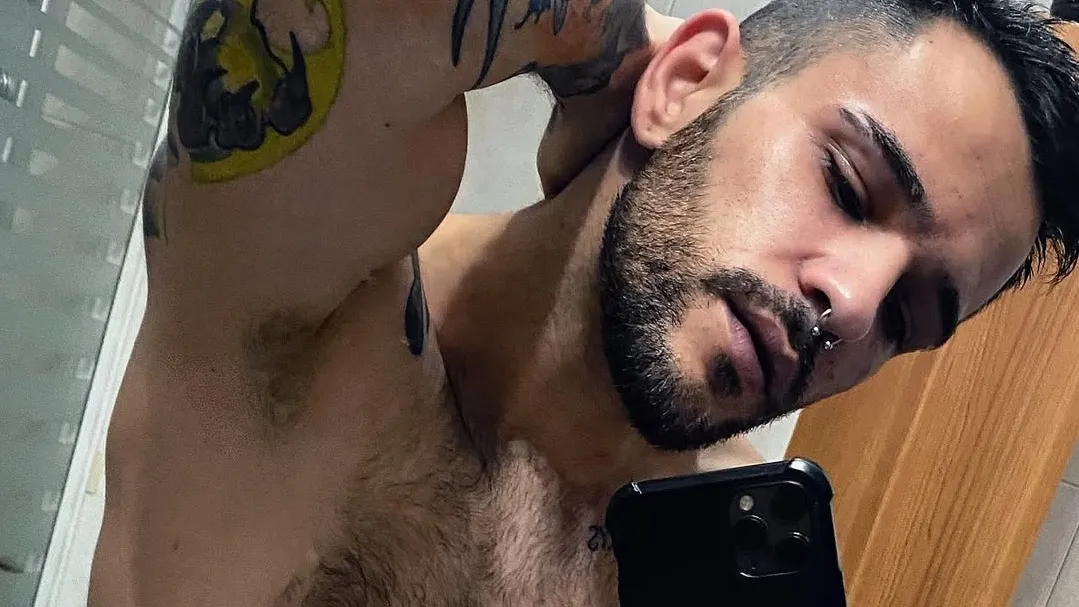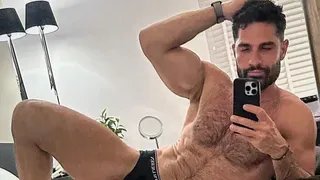April 11, 2022
Jesse Tyler Ferguson Pivots to Baseball in Broadway's 'Take Me Out'
Mark Kennedy READ TIME: 4 MIN.
Earlier this month, Jesse Tyler Ferguson got a private tour of hallowed ground – Yankee Stadium. He and the cast of the Broadway revival of the baseball-themed "Take Me Out" got to walk on the grass and soak in the silent stands.
"I wasn't expecting to be as moved as I was," says the "Modern Family" and Broadway star. "It was meaningful in ways that I didn't expect it to be."
Life was imitating art since the last scene of Richard Greenberg's Tony Award-winning play is a private moment in an empty Yankee Stadium. "I feel like I'm having some of these parallel moments," Ferguson says.
"Take Me Out" explores what happens when a Major League Baseball superstar comes out as gay, tracing the way it unsettles the team and unleashes toxic prejudices. Greenberg's unflinching look includes shower scenes with real water and nudity. (Theater patrons' phones are locked up upon entering the Hayes Theatre to protect actors' privacy.)
"Grey's Anatomy" star Jesse Williams plays the star baller and Ferguson plays his unathletic gay accountant, Mason Marzac, a sweetly zealous convert to the game. The play originally was staged in 2002 with Denis O'Hare playing Ferguson's part and winning a Tony for it.
The Associated Press recently asked Ferguson his thoughts on the play, why coming out is so important and the unintended benefit of taking away theater-goers' phones.
___
AP: What do you think the past 20 years have done to the play?
Ferguson: I guess, in a bad way, the play is still very relevant and feels very fresh. There's always been homophobia. That's something I don't think will ever go away. But there has been greater voice given to it and for permission to speak it loudly in the last two years specifically.
AP: We still do not have a major league player out of the closet in 2022. Why is it so important?
Ferguson: I just feel like visibility is so important and representation is so important. I didn't have that growing up as a kid, and I would turn on the TV and I didn't recognize myself on any programs. When I had the opportunity to do "Modern Family," I was just so grateful that I could be that for some kids – that I could be a part of a loving couple and someone would be looking at me, thinking, "OK, I can aspire to that. That's something I can hope for one day, having a family with someone the same sex as me." I just feel like in sports you still need that.
AP: Some pro athletes have come out, of course, but a tiny amount.
Ferguson: I applaud them and I know some of them. I've gotten to meet some of them, and they've told me firsthand, "There's more of us." It's just scary. I never want anyone to ever be forced out of the closet. I want it to be something that feels authentic and something that they're ready for. But at the same time, I wish there was more representation, more visibility, within sports.
AP: Did you ever catch the original "Take Me Out"?
Ferguson: I actually saw it three times. It was a play that definitely stayed with me. And Denis O'Hare's performance specifically stayed with me so much so, that when I was rereading the play, several of his line readings came flooding back. I barely remember what I ate yesterday and the fact that I could remember how he said certain lines was crazy.
AP: Are you a baseball fan in real life?
Ferguson: Listen, I'm not a huge baseball fan. I enjoy going to games, but through Mason and through his words I've fallen in love with it. He has this speech about what it means and how it stands in for democracy and the points he makes are just so lovely. I have fallen in love with baseball through him.
AP: The pandemic shutdown of Broadway in 2020 came as you were still in rehearsal. Did you spend the next two years going over your lines?
Ferguson: No. I couldn't pick up the piece. I couldn't look at these words. It was just too heartbreaking to look at it because I didn't know for sure if I was ever going to be able to do this play.
AP: All audience phones are locked up for this show. How has that affected the production, other than ensuring naked images of the actors don't circulate?
Ferguson: It's unheard of: We have 600 people every night who basically are staying off their devices. At intermission, they're talking about the play and they're looking at the program and they're staying in the moment. I do feel like the audiences have been more attentive than any other show I've ever done. And I think it's because they don't have that distraction and knowing that there's something in their pocket that they can check. It's truly out of sight, out of mind. And I think I kind of wish that they would do it to all shows.







